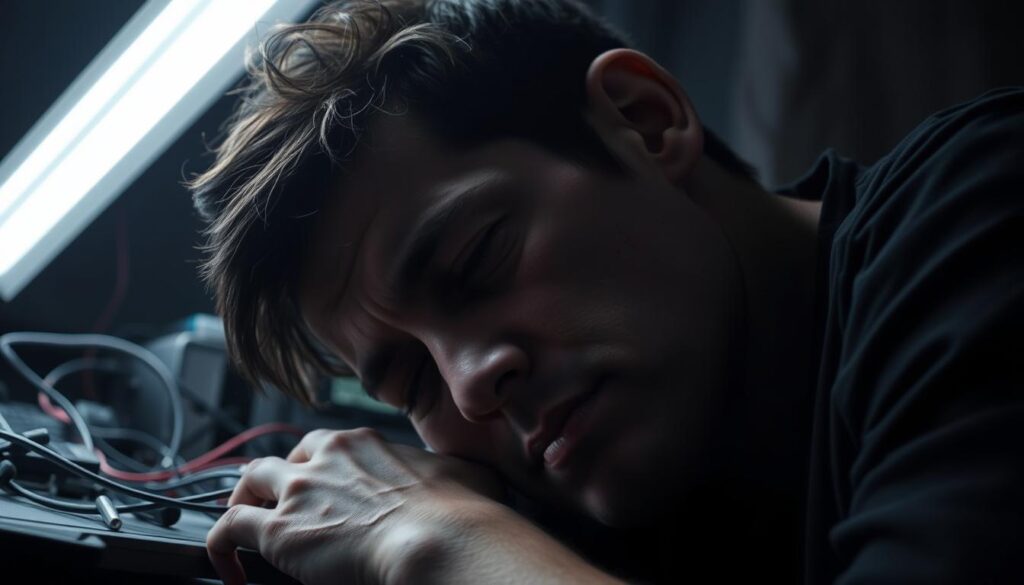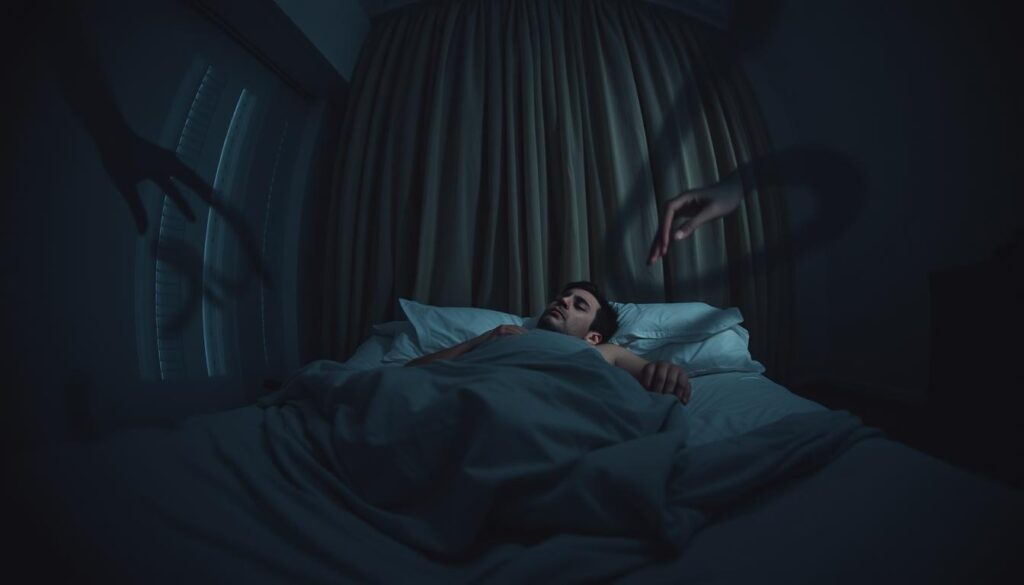Some people have gone beyond what’s normal by staying awake for a long time. They’ve tested how much the body can handle without sleep. This look into wakefulness records and sleep deprivation will explore the physical and mental impacts of not sleeping enough. It will show the amazing things people can do when they don’t sleep.

The world of staying awake is both interesting and complex. We know how sleep deprivation affects us, but what happens when we don’t sleep at all? The stories of those who stayed awake the longest show our incredible ability to endure. It’s important to understand the science behind staying awake for a long time to truly appreciate these achievements.
Introduction to Wakefulness Records
Wakefulness records and sleep deprivation are closely related. Our bodies need sleep, but some people have pushed their limits. By looking at wakefulness records and the stories behind them, we learn more about human endurance. We see how far we can go without sleep.
Key Takeaways Stayed Awake the Longest
- Wakefulness records show our incredible ability to stay awake and the limits of sleep deprivation.
- Sleep deprivation affects our bodies and minds in many ways.
- Understanding the science behind staying awake for a long time is key to appreciating these records.
- Wakefulness records often come from scientific experiments and Guinness World Records.
- Our bodies need sleep, but the effects of not getting it are complex.
- Wakefulness records push human endurance to the limit, showing amazing feats of staying awake.
The Science Behind Extended Wakefulness
It’s important to understand the science behind staying awake for long periods. Our bodies need a balance of sleep and wakefulness, controlled by circadian rhythms. Without sleep, our bodies start to show signs like microsleep episodes—short, sneaky naps, Stayed Awake the Longest.
Studies on sleep disorders reveal the dangers of messing with our sleep cycle. Circadian rhythms help our bodies work right, from hormones to metabolism. Staying awake too long can hurt our thinking, mood, and increase sleep disorders risk.
- The impact of microsleep episodes on cognitive function and overall health
- The role of circadian rhythms in regulating our sleep-wake cycle
- The potential consequences of disrupting our natural sleep-wake cycle, including the risk of sleep disorders
Understanding extended wakefulness helps us see how complex our bodies are. It shows why a good sleep-wake cycle is key. More research on circadian rhythms and sleep disorders can teach us a lot. It shows how crucial sleep is for our health and happiness Stayed Awake the Longest.
People Who Stayed Awake the Longest: Verified Records
Stayed Awake the Longest – The Guinness World Records are a key measure of human endurance. Wakefulness records show people who stayed awake for a long time. They have caught a lot of attention and praise.
These sleep deprivation challenges test the body’s limits. They also reveal how long-term wakefulness affects our minds.
Randy Gardner’s 11-day record is a famous example. It’s recognized by the Guinness World Records. Such records show how much we can endure. They also stress the need to know about sleep deprivation challenges and their health impacts, Stayed Awake the Longest.
These records prove our strength and offer a special look at sleep deprivation challenges. By studying these records, we learn more about our body’s response to not sleeping. We also see the dangers of sleep deprivation challenges, Stayed Awake the Longest.
The Famous Randy Gardner Experiment
Randy Gardner stayed awake for 11 days in 1964. He was a high school student at the time. His record for the longest time without sleep is still talked about today, Stayed Awake the Longest.
Challenging the Limits of Human Endurance
Scientists watched Gardner closely during his experiment. They saw how sleep deprivation affected his body and mind. The study showed us the dangers of not sleeping enough, like hallucinations, mood swings, and problems with thinking, Stayed Awake the Longest.
Scientific Observations and Long-term Effects
Gardner’s experiment helped us learn a lot about sleep deprivation. Some important findings were:
- Impaired cognitive function
- Mood disturbances
- Increased risk of chronic diseases
Gardner’s experiment shows us how important sleep is for our health. It also shows us the dangers of not sleeping enough. We need more research to understand these effects better, Stayed Awake the Longest.
Military Research and Extended Wakefulness
Military research has looked into sleep deprivation and how to stay awake longer. This is crucial for soldiers who must stay alert for long times. The goal is to find ways to lessen sleep deprivation effects and boost wakefulness, Stayed Awake the Longest.
Some important discoveries from military research on sleep deprivation are:
- Ways to lessen sleep deprivation impact on thinking skills
- Methods to keep alert and awake during long wakefulness periods
- Techniques to enhance sleep quality and length in stressful situations
Learning about military research on sleep deprivation offers insights into wakefulness and sleep. These findings can help people manage their own sleep deprivation and stay more alert, Stayed Awake the Longest.
Psychological Effects of Extreme Sleep Deprivation
Extreme sleep deprivation can severely impact a person’s mind. It can make it hard to make good decisions and react quickly. It also leads to feelings of anger, worry, and sadness, Stayed Awake the Longest.
Changes in Cognitive Function
Research shows sleep deprivation can harm how well we think. It affects our ability to focus, remember things, and solve problems. For instance, a study by the American Academy of Sleep Medicine found sleep-deprived people did poorly on tests of attention and memory, Stayed Awake the Longest.
Emotional Impact and Hallucinations
The emotional toll of not getting enough sleep can be huge. It can cause mood swings, anxiety, and even seeing things that aren’t there. In extreme cases, it can lead to psychotic episodes with hallucinations and delusions. It’s crucial to know how sleep affects our mental health, Stayed Awake the Longest.
Some common effects of sleep deprivation on emotional impact include:
- Irritability and mood swings
- Anxiety and depression
- Emotional instability
Modern Cases of Extended Wakefulness
In recent years, people have been trying to stay awake for longer periods. This has raised both curiosity and concern. It shows how much we can push our bodies without sleep.
These attempts are driven by different reasons. Some want to challenge themselves, while others are doing it for science. It’s interesting to see why they do it.
Some people stay awake for days to draw attention to important issues. Others test how long they can stay awake. These efforts help us learn about the effects of not sleeping enough.
Studies have found some key things. For example, not sleeping well can hurt our thinking and judgment. It can also lead to seeing things that aren’t there and affect our mental health.
Not sleeping can also make us feel tired, give us headaches, and weaken our immune system. These are just a few examples.

More research is needed to understand sleep and wakefulness. By looking at these cases, we can learn more about our bodies. This knowledge helps us take better care of our sleep and wakefulness.
Medical Conditions That Prevent Sleep
Sleep is crucial for our health. Certain medical conditions can disrupt it. Fatal familial insomnia, a rare genetic disorder, affects the brain’s sleep ability. It causes gradual brain degeneration, leading to complete insomnia and death.
Other sleep disorders like sleep apnea and restless leg syndrome also impact sleep. These conditions can make it hard to get a good night’s rest.
Medical conditions that prevent sleep can harm our health and well-being. Sleep disorders can cause fatigue, lower cognitive function, and increase accident risks. They can also worsen existing health issues like diabetes and heart disease.
It’s important to understand these conditions to improve treatment plans. This can help those affected live better lives.
- Fatal familial insomnia
- Sleep apnea
- Restless leg syndrome
- Narcolepsy
- Insomnia
These conditions have various causes, including genetics, environment, and lifestyle. Treatment options depend on the condition. They may include medication, lifestyle changes, and therapy.
Raising awareness about these conditions can help. It can lead to better diagnosis, treatment, and support for those affected.
Health Risks of Extended Sleep Deprivation
Not getting enough sleep can harm our health a lot. It affects our bodies and minds. Our immune system gets weaker, and our heart health can suffer. This can cause everything from feeling tired to serious health problems.
Our mental health also takes a hit when we don’t sleep well. We might feel more depressed, anxious, or have other mental health issues. It’s really important to see how sleep keeps us healthy and make it a priority.
Some big health risks from not sleeping enough include:
- Weakened immune system
- Cardiovascular problems
- Increased risk of depression and anxiety
- Cognitive impairment

To avoid these problems, we need to sleep well and regularly. We should also make our sleep space comfortable. By focusing on sleep, we can lower the chances of health issues and stay healthy.
Guinness World Records and Sleep Deprivation
Guinness World Records is known for showing human endurance and achievements. Sleep deprivation records show how long people can stay awake. Randy Gardner holds the record for staying awake for 264.4 hours in 1964. This record is still unbeaten and is one of the most impressive.
Sleep deprivation can harm our bodies and minds. It can make us less sharp, change our mood, and increase accident risks. Yet, many try to beat the record for staying awake the longest. The Guinness World Records has many stories of these attempts.
There are many sleep deprivation records, like watching TV for the longest time or staying awake on a treadmill. These records show how our bodies can handle sleep deprivation. The Guinness World Records encourages people to test their limits and achieve greatness, even when tired.
Looking into Guinness World Records on sleep deprivation helps us understand our bodies better. It shows how sleep deprivation affects us physically and mentally. These records are a symbol of human achievement and the drive for excellence.
Conclusion: Understanding the Limits of Human Wakefulness
As we wrap up this fascinating look at human wakefulness, we see the incredible stories of those who’ve gone without sleep. These tales show us how strong and flexible our minds and bodies can be. They reveal the deep effects of not sleeping enough on our bodies and minds.
Trying to stay awake for a long time is truly amazing. It shows us how much we can do. These stories make us wonder at our bodies’ ability to adjust and the secrets they share about sleep and thinking.
These experiences teach us a lot. They help doctors, the military, and us understand why sleep is so important. Let’s be inspired by those who have tested the limits of wakefulness. Their stories remind us of our own potential, as we learn more about sleep and being awake.
FAQ
What is the science behind extended wakefulness?
Our bodies need sleep and wakefulness to stay balanced. This balance is controlled by our circadian rhythms. When we don’t sleep, our bodies react in different ways. This can include short, involuntary naps called microsleeps.
Who has officially been recognized for staying awake the longest?
Randy Gardner holds the record for staying awake for 11 days. His feat is well-documented. Other impressive records have also been verified.
What were the findings of the Randy Gardner experiment?
Randy Gardner’s experiment showed us the effects of extreme sleep deprivation. It helped us understand how long we can stay awake.
How has military research explored the effects of sleep deprivation?
Military research has studied sleep deprivation and how to stay awake longer. This is important for soldiers who need to stay alert for long times. The research helps find ways to deal with sleep loss.
What are the psychological effects of extreme sleep deprivation?
Not sleeping enough can greatly affect our minds. It can change how we think and feel. It can even cause hallucinations. Knowing these effects helps us understand the challenges of staying awake for a long time.
What medical conditions can prevent sleep?
Some diseases, like fatal familial insomnia, can stop us from sleeping. They make us stay awake until we die. Learning about these conditions helps us understand sleep and wakefulness better.
What are the health risks of extended sleep deprivation?
Not sleeping enough is bad for our health. It weakens our immune system and can cause heart problems. It also increases the risk of depression and anxiety. Sleep is key to staying healthy.
How has Guinness World Records documented attempts at staying awake for the longest periods?
Guinness World Records has recorded many attempts to stay awake for a long time. They recognize the efforts and achievements of those who try to break the record.
Source link
- https://guinnessworldrecords.com/news/2023/1/whats-the-limit-to-how-long-a-human-can-stay-awake-733188
- https://www.indiatoday.in/education-today/gk-current-affairs/story/what-is-the-longest-someone-has-gone-without-sleep-2515183-2024-03-15
- https://health.clevelandclinic.org/how-long-can-you-go-without-sleep
- https://en.wikipedia.org/wiki/Randy_Gardner_sleep_deprivation_experiment
- https://www.usatoday.com/story/news/nation/2024/08/14/norme-no-sleep-rumble-stream/74796291007/
